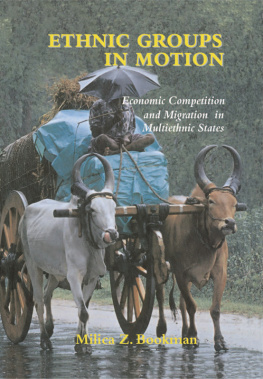ETHNIC GROUPS IN MOTION
Economic Competition and Migration in Multiethnic States
CASS SERIES: NATIONALISM AND ETHNICITY
ISSN 1462-9755
General Editor: William Safran
This new series draws attention to some of the most exciting issues in current world political debate: nation-building, autonomy and self-determination; ethnic identity, conflict and accommodation; pluralism, multiculturalism and the politics of language; ethnonationalism, irredentism and separatism; and immigration, naturalization and citizenship. The series will include monographs as well as edited volumes, and through the use of case studies and comparative analyses will bring together some of the best work to be found in the field.
Ethnicity and Citizenship: The Canadian Case (NEP 1/3 Aut 1995)
Edited by Jean Laponce and William Safran
Nationalism and Ethnoregional Identities in China (NEP 4 1&2, Spring/Summer 1998)
Edited by William Safran
Identity and Territorial Autonomy in Plural Societies (NEP 5 3/4/Aut/Win 1999)
Edited by William Safran and Ramon Maz
Ideology, Legitimacy and the New State: Yugoslavia, Serbia and Croatia
Sinia Maleevi
Diasporas and Ethnic Migrants: Germany, Israel and Russia in Comparative Perspective
by Rainer Munz and Rainer Ohliger
Ethnic Groups in Motion: Economic Competition and Migration in Multiethnic States
by Milica Z. Bookman
ETHNIC GROUPS IN MOTION
Economic Competition and Migration in Multiethnic States
Milica Z. Bookman
St Josephs University, Philadelphia
First published in 2002 in Great Britain by
FRANK CASS PUBLISHERS
2 Park Square, Milton Park,
Abingdon, Oxon, OX14 4RN
and in the United States of America by
FRANK CASS PUBLISHERS
270 Madison Ave,
New York NY 10016
Transferred to Digital Printing 2005
Website: www.frankcass.com
Copyright 2002 Milica Z. Bookman
British Library Cataloguing in Publication Data
Bookman, Milica Zarkovic
Ethnic groups in motion: economic competition and migration in multiethnic states. (Nationalism and ethnicity)
1. Ethnic groups 2. Emigration and immigration 3. Migration, Internal
I. Title
304.8
ISBN 0-7146-5231-8 (cloth)
ISBN 0-7146-8211-X(pbk)
Library of Congress Cataloging-in-Publication Data
Bookman, Milica Zarkovic.
Ethnic groups in motion: economic competition and migration in multiethnic states /
Milica Z. Bookman.
p. cm. (Nationalism and ethnicity, ISSN 1462-9755)
Includes bibliographical references and index.
ISBN 0-7146-5231-8 (cloth) ISBN 0-7146-8211-X (pbk.)
1. Emigration and immigration Economic aspects. 2. Migration, Internal Economic aspects. 3. Competition. 4. Ethnic conflict. I. Title II. Cass series nationalism and ethnicity.
JV6098.B66 2002
304.8dc21
2002071600
All rights reserved. No part of this publication may be reproduced, stored in or introduced into a retrieval system or transmitted in any form or by any means, electronic, mechanical, photocopying, recording or otherwise, without the prior written permission of the publisher of this book.
Typeset in 10.5/12pt Baskerville by Vitaset, Paddock Wood, Kent
For Richard,
Lets go for seven out of seven!
Foreword
The Frank Cass series on Nationalism and Ethnicity aims at presenting both in-depth monographic and comparative-theoretical approaches to nationalism, nation-building, and ethnicity. The present study by Milica Bookman fulfills that aim. Ambitious in its scope, thoroughly researched and impressively documented, it deals exhaustively with the relationship between economics, migration, ethnic consciousness and mobilization, interethnic competition or cooperation for obtaining a share of scarce resources, and economic growth and decline.
The author is not an economic determinist or instrumentalist in a dogmatic sense; while discussing the economic motivation for the migration patterns of ethnic groups, she focuses equally on the impact of immigration on the labor market and on economic performance as well as on cultural patterns and political values. Her universe of research is wide ranging; in making her case, the author uses historical as well as statistical evidence from multiethnic countries around the globe.
A major theme of Professor Bookmans work is the relationship between host countries and immigrants. That relationship is determined by the economic system of the receiving country, its general macroeconomic policies, and measures aimed specifically at immigrants who constitute an ethnic minority. The author analyzes a variety of policy choices, both inclusionary and exclusionary. The former include affirmative action, tax concessions, subsidies, and easy access to education, jobs, and welfare state benefits. Among the latter are entry quotas, ethnic restrictions on employment; the resort to scab and slave labor, ethnic cleansing, deportation, and other forms of involuntary migration. The examination of other measures directed at immigrants that have economic consequences includes language policies and the application of the criterion of language use for discrimination in hiring and access to citizenship. In this connection, attention is also devoted to the negative economic impact of ethnic repression on a nations economy. Finally, there is a discussion of the economic effects of out-migration on the sending country.
Professor Bookman takes up a number of important issues: the role of the market in moderating or sharpening ethnic consciousness; the question of whether capitalism fosters the integration of ethnic minorities or discrimination against them; and the fate of ethnic minority labor in the event of economic stagnation or decline. Questions are also raised concerning the positive or negative impact of immigrants on the host country, especially in terms of economic and political behavior: do they contribute to, or detract from, the ethos of productivity or democratic ideology? Does their presence serve to make the culture of the receiving society more interesting or, on the contrary, contribute to cultural dilution and insecurities with respect to national identity? These questions are, inter alia, applied also to diasporas, whose number and impact have become increasingly important.
William Safran
Acknowledgments
In writing this book, I have depended on many people to help, cajole, enable, introduce, fund, advise, and encourage. I was cognizant of their contribution on a daily basis, whether it resulted in a page well written or a draft quickly shredded. Therefore, I take this opportunity to express my deepest appreciation to them.
I owe a debt of gratitude to those who put me in contact with valuable sources and helped set up interviews: Charlie Schreiner, Wayne Selcher, and Alfonso Obughezi. I am grateful to Gustavo Gonzaga, Adalberto Cardoso, and Miladin Kovacevic for answering my questions and raising new ones.
Selected contents of this book were presented to academic audiences during lectures and at conferences. I want to thank Al Rubinstein, Ljubisa Adamovic, and Stephen Lubermann for their useful comments.











